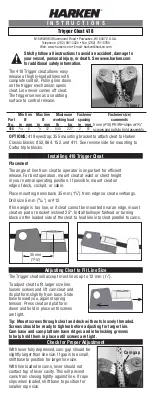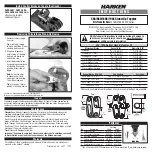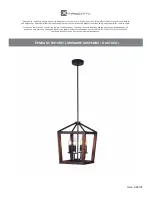
2
WARNING
Dental workers are exposed to N
2
O during
administration of N
2
O/O
2
conscious sedation
analgesia. NIOSH has recommended that exposures
should be minimized. Contact NIOSH (1-800-35-
NIOSH) to receive NIOSH Publications on
Control of
Nitrous Oxide in Dental Operatories.
Exposure can
be minimized by effective controls. National Institute
for Occupational Safety and Health (NIOSH)
publications state that controls, including System
Maintenance, Ventilation and Work Practices can
effectively reduce N
2
O concentrations in dental
operations. Your Porter Scavenger System is an
important part of the system of controls.
2.
PIPING REQUIREMENTS
2.1.
Sedation Outlet Connections (N
2
O/O
2
)
This portion of the 6255-1 outlet station has
the option of unscrewing the gas block,
(N
2
O/O
2
) (Figure 2) from the support plate
(three screws), inverting the block so the
pipes may extend downward (Figure 3).
2.2.
IMPORTANT:
When remounting the
blocks to the support plate use the
lower
set
of holes on the plate (Figure 3) to insure the
faceplate will line up. (Note: This is only
when pipes are pointing down.)
2.3. Pipes can then be joined to their appropriate
3/8” OD tube for Nitrous Oxide, and ½” OD
tube for Oxygen. (See section below.)
2.4.
Central Suction Powered Systems:
Determine the direction in which the piping
is needed.
2.5. If the vacuum tube (1/2” OD) is required in
the upward position, be aware that moisture
could drain back into the tubing. It is
recommended that a trap be used.
2.6. If the vacuum tube (1/2” OD) is required in
the downward position, unscrew the vacuum
block from the support pole (two screws),
invert the block (Figure 4) and screw the
vacuum block back onto the support plate.
2.7.
IMPORTANT:
When remounting the block
to the support plate use the
upper
set of
holes on the plate. (Note: This is only when
pipe is pointing down.)
Figure 2
Figure 3
























